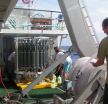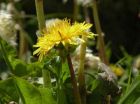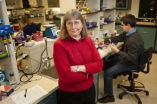EARTH: Oil and water help US win World War II
2011-02-16
(Press-News.org) Alexandria, VA – The U.S. had two key strategic advantages over the Axis in World War II: oil and water. Although other factors played major roles in the U.S. and its allies winning the war, these two natural resources played a much larger role than recognized.
World War II was the first highly mechanized war. In the March feature "How Oil and Water Helped the U.S. Win World War II," EARTH magazine explores how the abundance of domestic US oil and water in the South and Pacific Northwest drove not only tanks and planes, but also industrial production and technological innovation. That energy allowed the U.S. to supply its military and its allies with aircraft, armored vehicles and tanks and other heavy equipment - as well as the atomic bomb - that eventually overpowered Germany and Japan.
Read more of this historical analysis in the March issue, as well as other stories on topics such as how remote sensing helps aid agencies prepare for famine before it strikes and who should be paying for cleanup after wildfires and landslides strike, and follow along as a former NASA special investigator details a decade-plus of tracking moon rock thefts.
INFORMATION:
These stories and many more can be found in the March issue of EARTH, now available digitally (http://www.earthmagazine.org/digital/) or in print on your local newsstands.
For further information on the March featured article, go to http://www.earthmagazine.org/earth/article/40e-7db-2-f .
Keep up to date with the latest happenings in earth, energy and environment news with EARTH magazine, available on local newsstands or online at http://www.earthmagazine.org/. Published by the American Geological Institute, EARTH is your source for the science behind the headlines.
END
ELSE PRESS RELEASES FROM THIS DATE:
2011-02-16
OAK BROOK, Ill. – Feb. 15, 2011 – Researchers from Korea report that, compared with conventional sedation, balanced propofol sedation (BPS) using propofol in combination with midazolam and meperidine, provided higher health care provider satisfaction, better patient cooperation, and similar adverse event profiles in patients undergoing therapeutic endoscopic procedures. This is the first prospective study of BPS in direct comparison with conventional sedation. The researchers note that this study provides further evidence to support the adoption of endoscopist-directed ...
2011-02-16
Bethesda, MD - William T. Talman, MD, President of the Federation of American Societies for Experimental Biology (FASEB), praised President Barack Obama for his continuing support for science and engineering. "The President recognizes that our future depends on research," Talman stated. In a letter to President Obama, Talman noted that his "support for this critical investment—even during a time of unprecedented budgetary constraints—will help to improve the lives of millions of people."
In his FY 2012 Budget, President Obama proposed a $745 million increase over the ...
2011-02-16
Composed of diverse elements, mostly of plastic, with little metal used, improvised explosive devices are very difficult to detect. In cooperation with two colombian universities, scientists at EPFL's Electromagnetic Compatibility Laboratory have found a solution. They have developed a device enabling the remote explosion of these mines, by using the energy from their electromagnetic impulses.
This type of mine is often used by guerillas or terrorist groups in conflict zones, and is present in many regions of the world, such as Colombia, Iraq and Afghanistan. They kill ...
2011-02-16
MIAMI – Feb 15, 2011 – A study by scientists at the University of Miami (UM) Rosenstiel School of Marine & Atmospheric Science suggests a new way to estimate how much of the ocean's pollution is falling from the sky. The new findings can help improve scientific understanding of how toxic airborne chemicals, from the burning of fossil fuels and industrial power plants emissions, are impacting the oceans globally.
By measuring Beryllium-7 (7Be) isotope concentrations in the ocean, which is found naturally throughout Earth's atmosphere, Rosenstiel School scientists David ...
2011-02-16
Potholes in the road or a park bench in need of repair – we all come across these or similar problems every now and then. If only there were a simple way of reporting them to the right department of the public administration! The latest mashup technology and mobile applications make it possible to come up with solutions.
Inspired by the UK website www.fixmystreet.com, the Fraunhofer Institute for Open Communication Systems FOKUS in Berlin is taking this approach further. Damage reports can be assigned GPS coordinates by cell phone and entered. The system then provides ...
2011-02-16
You might think that a loving partner helps keep you on track—say, when you want to stick to your jogging or concentrate on your studies. But a new study in Psychological Science, a publication of the Association of Psychological Science, reports the opposite: Thinking about the support a significant other offers in pursuing goals can undermine the motivation to work toward those goals—and can increase procrastination before getting down to work.
The study's authors, psychological scientists Gráinne M. Fitzsimons of Duke University and Eli J. Finkel of Northwestern University, ...
2011-02-16
The auto industry faces major challenges. New models are entering the market at ever shorter intervals, products are becoming more complex, and the trend towards electric cars requires modified vehicle structures. European production sites are coming under increasing cost pressure from low-wage countries. Cost reductions, shorter production times, new materials and innovative assembly techniques are needed if companies are to remain competitive. To achieve these goals, 23 business and research organizations are participating in the EU's Pegasus project (www.pegasus-eu.net). ...
2011-02-16
Just when everyone thought that almost every plant species on the Iberian Peninsula had been discovered, Spanish researchers have discovered Taraxacum decastroi and Taraxacum lacianense, two dandelions from the Pyrenees and the Cordillera Cantábrica mountain range, respectively. This finding confirms Spain's privileged position as a hotbed of biodiversity.
"It's hard to find new species now in Spain. It depends on the complexity of the group of plants you study", Antonio Galán de Mera, lead author of the study and a researcher in the Department of Biology (Botany) at ...
2011-02-16
WASHINGTON – A National Research Council committee asked to examine the scientific approaches used and conclusions reached by the Federal Bureau of Investigation during its investigation of the 2001 Bacillus anthracis mailings has determined that it is not possible to reach a definitive conclusion about the origins of the anthrax in letters mailed to New York City and Washington, D.C., based solely on the available scientific evidence.
Findings of the committee's study include:
The FBI correctly identified the dominant organism found in the letters as the Ames strain ...
2011-02-16
Someday, that potted palm in your living room might go from green to white, alerting you to a variety of nasty contaminants in the air, perhaps even explosives.
The stuff of science fiction you say? Not so, says a Colorado State University biologist whose research is funded in part by Homeland Security's Science and Technology Directorate (DHS S&T), as well as by the Defense Advanced Research Projects Agency (DARPA), the Office of Naval Research (ONR), and others.
Dr. June Medford and her team in the Department of Biology at Colorado State have shown that plants ...
LAST 30 PRESS RELEASES:
[Press-News.org] EARTH: Oil and water help US win World War II




